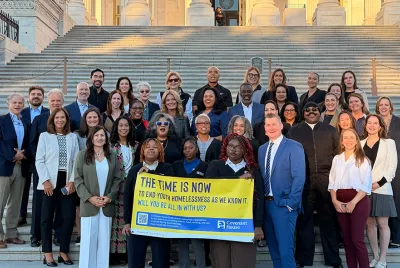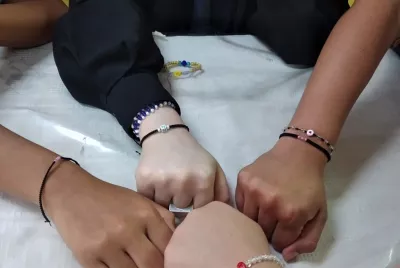Out of Sight, Out of Mind: A Nonsolution to the Homelessness Crisis in Florida

Since the U.S. Supreme Court ruling in Johnson vs. Grants Pass, we’ve been following impacts across the country. As Florida prepares to enforce a new law aimed at removing homeless individuals from public spaces, we spoke with Reneé Trincanello, CEO of Covenant House Florida, to explore the implications of the legislation, the challenges it poses for the young people we serve, and how Covenant House is responding to the evolving crisis of youth homelessness.
Key Takeaways
- New Florida Law on Homelessness: Set to take effect Oct. 1, the law mandates the relocation of homeless individuals from public spaces to shelters or government-run encampments. It prioritizes removing people from view rather than long-term solutions.
- Concerns: Covenant House Florida CEO Reneé Trincanello and other advocates warn that the law criminalizes homelessness without addressing its root causes like low wages and housing costs.
- Impact on Youth: Vulnerable populations, such as youth aging out of foster care, may be forced into unsafe conditions or face fines and arrest under the new law.
- Shift in Models: The law moves away from "housing first" models to more punitive measures that prioritize clearing streets at the expense of long-term solutions.
- Our Plan: Covenant House plans to tackle the root causes of youth homelessness through our strategic plan, The Journey Home, in contrast to the temporary fixes proposed by the new law. Locally, Covenant House Florida has plans to expand its Fort Lauderdale shelter to meet rising needs.
Even before the Supreme Court heard oral arguments in Johnson vs. Grants Pass this spring, Florida Governor Ron DeSantis had already signed into law a measure that would remove homeless individuals from Florida streets, transport them to shelters or government-sanctioned encampments, and divert precious resources from real solutions to the homelessness crisis in the state. The law goes into effect Oct. 1.
“Out of sight, out of mind,” says Covenant House Florida CEO Reneé Trincanello, summing up the law’s approach to addressing the crisis in Florida, one of the least affordable places to live in the U.S., according to the nonpartisan Florida Policy Institute.
It was the decision of the Supreme Court justices in Johnson vs. Grants Pass this summer that opened the way for the Florida law to be applied. In Johnson, the justices said that cities and states could indeed criminalize people sleeping in public spaces, even when no shelter was available. Since then, advocates for people experiencing homelessness have had their eyes on local and state governments, worried these may follow suit, as Florida clearly has.
Triggers of Homelessness
But the events and conditions that trigger homelessness for young people, adults, and families are so much more complex than either the Florida law, referred to as the “Unauthorized Public Camping and Public Sleeping” law, or Johnson vs. Grants Pass allow.
“When people aren’t paid a living wage, when they come from communities that are under-resourced and marginalized, and when they lack access to the social determinants of health, we’re just continuing to pipeline groups of people into circumstances that they can’t otherwise break free from,” Reneé says.
Anyone who is living paycheck to paycheck may suddenly become homeless, for example, as may a youth who simply has aged out of foster care, or suddenly lost a parent, or come out as LGBTQ+ to an unaccepting family. In Florida, if they’re caught sleeping outside, they can be shuttled to an overcrowded shelter, an unsafe encampment or, if they refuse to go, they can be arrested and/or fined.
The Florida Law: A Nonsolution
The Florida law directs municipalities to move people sleeping on “city streets, sidewalks, and parks” into temporary shelters monitored by law enforcement. When the shelters are filled, they may be moved to “temporary campsites” administered by the Department of Children and Families, where services for substance use and mental health issues are supposed to be available. But there’s a problem.
“Municipalities don’t have the bandwidth, they don’t have the money, they don’t have the location, and they don’t have the working knowledge of the homeless population,” Reneé says. “And now that they want to have encampments with children in them, for some reason, they think that, in combination with law enforcement, is going to create an environment where people will want to go and where they’ll be safe. It’s unrealistic.”
She adds that the law represents a swing of the pendulum from a “housing first” approach to one where getting unhoused people off the street and out of view is primary. The governor’s office says the idea is to “keep Florida’s streets safe,” but Reneé says the reality is that there is a severe lack of affordable housing in the state.
In Broward County, where Covenant House Florida’s Fort Lauderdale site is located (we also have a site in Orlando), Sheriff Gregory Tony said in a statement that the new law places the burden on cities and counties to enforce it “or face legal consequences from the state attorney general and citizen-initiated lawsuits,” which could further drain city coffers for services.
But, he added, already “Broward County jails are understaffed and underfunded. Jail is not the place to shelter and provide services to the homeless,” he affirmed, and the Department of Detention will not accept individuals brought to the jail for ordinance violations, he said.
It Takes a Big Vision to Tackle a Big Challenge
Covenant House Florida, like all our sites in 34 cities across five countries, is designed not to get youth facing homelessness out of view but to invite them into our residences, where they find safety, healing, and opportunity. We wrap youth in unconditional love and absolute respect, and our high-quality programs and services offer young people the tools they need to achieve sustainable independence and take their lives in the direction of their dreams.

Covenant House Florida has been working hard to identify and secure a new site to replace our current Fort Lauderdale shelter. Our intention is to build a residence with increased capacity, aiming to serve 60 youth in our short-term safe haven and 16 in our longer-term transitional living program. If the community supports this plan, upon completion, we will be housing more youth and helping them, through the relentless support of our devoted staff, to reach and embrace independence.
At Covenant House, we know it takes a big vision to tackle a big challenge. Our North Star is to end youth homelessness as we know it. We’re putting all our resources into a strategic plan we call The Journey Home. Far from seeking to remove young people facing homelessness from view, it seeks to address the root causes of homelessness, provide critical intervention services, and support youth with aftercare programs that include the promotion of affordable housing.
“Every young person that we’re serving, and every chronically homeless person in the community, they all deserve basic dignity, human rights, and access to the power of choice,” Reneé says, referencing one of Covenant House’s five principles. The new law in Florida, she says, “takes the power of choice away.”
Real solutions are available. Covenant House offers real solutions.


